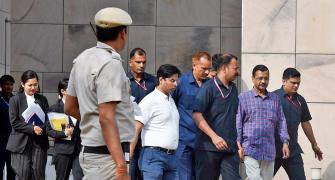The records, however, reveal that Mushin, 64, availed of these companies's shares at their Initial Public Offerings that led to the nearly seven-year investigation and conflict of interest charges.
Mushin's attorney Joshua Hochberg, in a statement provided to rediff India Abroad, said, 'At the time of his planned retirement in 2005, the World Bank began a review of Mr Mushsin concerning matters which are now more than eight years old.'
'Ultimately, no findings were made that Mr Muhsin interfered with Bank contracting. At all times, the Bank's comprehensive procurement policies and controls were followed. Mr Muhsin did not determine which companies were awarded contracts. Contracts were awarded through the independent central procurement department,' the statement said.
Hochberg also pointed out that, 'In addition, the Bank has stated that it "did not make any findings regarding abuse of position," and went on to state that 'Mr Muhsin made all financial disclosures required by him by the Bank which had a full opportunity to scrutinise his transactions.'
'He paid for all shares he purchased and reported them in line with the Bank disclosure policy,' Hochberg added in his statement.
The Bank, which barred Satyam in December, came out publicly on January 11, to state that it 'has decided to make public the names of all companies that have been debarred from receiving direct contracts from the Bank Group under its corporate procurement programme.'
It said 'the change was made in the interest of fairness and transparency,' and noted that 'this change aligns the disclosure practice for companies that provide goods and services directly to the Bank with the current policy governing procurement on Bank financed projects in developing countries.'
'In parallel with the Bank's disclosure of the names of companies and individuals debarred on Bank financed projects from now on, the Bank Group will publicly list the names of companies debarred from its corporate procurement,' the Bank said.
It said Satyam was barred for eight years from September 2008 for 'providing improper benefits to Bank staff and failing to maintain documentation to support fees charged for its subcontractors.'
Wipro was barred for four years from June 2007 for 'providing improper benefits to Bank staff.'
A third Indian IT firm, Megasoft Consultants Ltd, was also barred for four years from December 2007, for 'participating in a joint venture with Bank staff while also conducting business with the Bank.'
Mushin, a Sri Lankan national, declined to be interviewed for this report, saying he was constrained because he is in litigation with the Bank and the basis of his challenge is that there have been leaks to the press by the Bank's investigation department in violation of Bank rules, and whatever he says publicly could prejudice his case.
Sources told rediff India Abroad that at the time the investigation was launched in 2005 against Mushin, during the tenure of then Bank president Paul Wolfowitz, the charge was about irregularities on procurement, and that Mushin in his capacity as CIO had issued sole source contracts to Satyam and as a result benefited from it as had other staff in his department.
Subsequently, allegations had also been leveled that he had bought Satyam and Wipro shares at the time they were seeking to do business with the Bank, and hence there was a conflict of interest. Aggravating this issue was apparently the belief that Mushin had not disclosed his stock holdings to the Bank.
Even though the Bank, which had held Mushin's retirement benefits and other reimbursements due to him in abeyance, returned all of this in 2007, it held that there was an appearance of conflict of interest because Mushin had bought shares from these companies. At this time, Mushin challenged the Bank's determination, saying that he had disclosed his shares.
Although the Bank first took the position that there had been no such disclosure, it later discovered that there indeed had been such a disclosure.
Sources close to Mushin have said he regrets the indiscretion of purchasing the shares that he did, and even though it was perfectly legal, it gave the perception of conflict of interest, that his buying them under the Friends and Family IPOs seemed as it was a quid pro quo by the two companies that had secured handsome Bank contracts.
The sources, however, asserted that Satyam's contracts worth nearly $100 million over a eight-year period with the Bank were publicly bid upon and that Satyam had come out tops among 13 participants.
Wipro's contracts were a fraction of Satyam's contracts -- about $900,000. Megasoft, which first conducted a study for the Bank worth $150,000, then had essentially done 'body shopping' for the Bank where it did staff augmentation for a total value of $14 million over a three-year period.
Wipro has said its representatives had offered the World Bank, through the Bank's CIO and staff, shares in Wipro's IPO in 2000, and that three World Bank staffers had purchased a total of 1,750 shares for about $72,000.
The company said the stock was part of what is called a directed share programme, which allowed Wipro employees and clients to purchase its American Depository Shares, which trade in the US stock exchange.
Wipro Chief Financial Officer Suresh Senapaty was quoted as saying that 'if we knew (about the Bank's debarment policies) we wouldn't have done it.'
Company co-Chief Executive Officer Girish Paranjpe was quoted as saying that the alleged 'improper benefits' were not any form of illegal inducement and were in keeping with US law.
Satyam's and Wipro's ADRs were allocated by their US underwriters, Merrill Lynch and Morgan Stanley respectively, under the Securities Exchange Commission's rules. Merrill Lynch and Morgan Stanley allocated the shares to Mushin and other Bank staffers.







